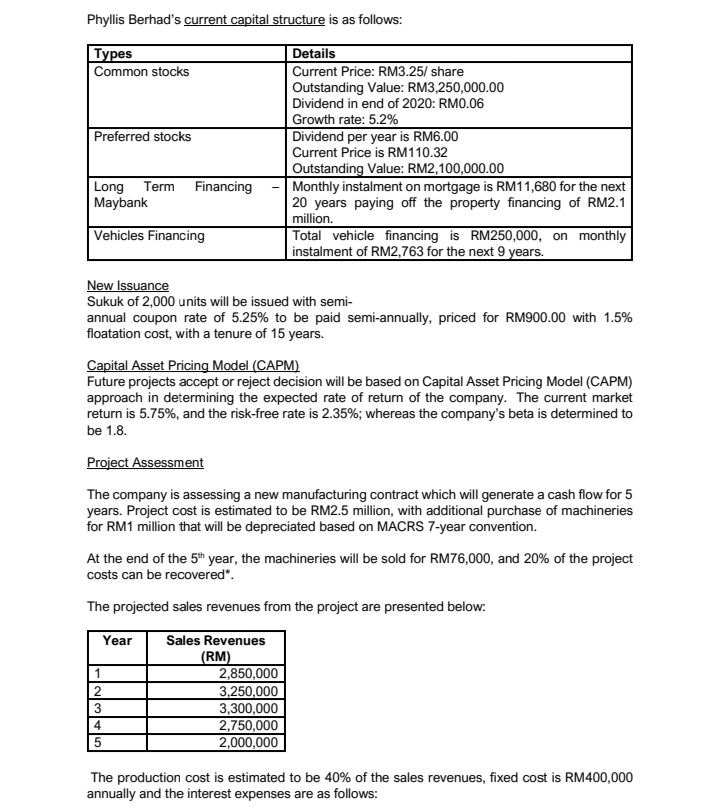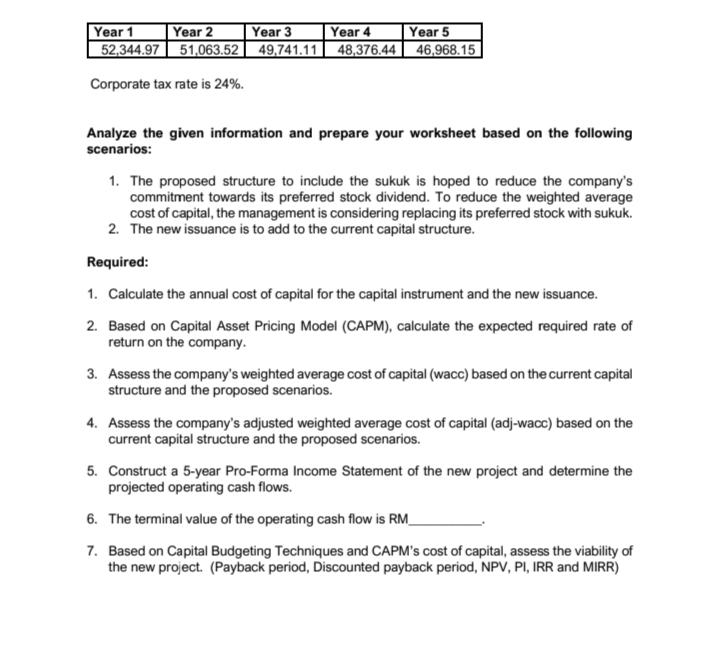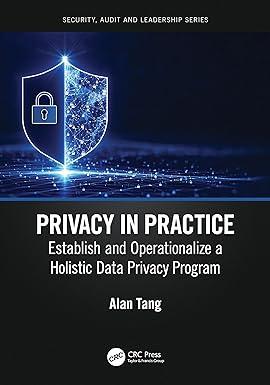

Phyllis Berhad's current capital structure is as follows: Types Common stocks Preferred stocks Details Current Price: RM3.25/ share Outstanding Value: RM3,250,000.00 Dividend in end of 2020: RM0.06 Growth rate: 5.2% Dividend per year is RM6.00 Current Price is RM110.32 Outstanding Value: RM2,100,000.00 Monthly instalment on mortgage is RM11,680 for the next 20 years paying off the property financing of RM2.1 million. Total vehicle financing is RM250,000, on monthly instalment of RM2,763 for the next 9 years. Long Term Financing Maybank Vehicles Financing New Issuance Sukuk of 2,000 units will be issued with semi- annual coupon rate of 5.25% to be paid semi-annually, priced for RM900.00 with 1.5% floatation cost, with a tenure of 15 years. Capital Asset Pricing Model (CAPM) Future projects accept or reject decision will be based on Capital Asset Pricing Model (CAPM) approach in determining the expected rate of return of the company. The current market return is 5.75%, and the risk-free rate is 2.35%; whereas the company's beta is determined to be 1.8. Project Assessment The company is assessing a new manufacturing contract which will generate a cash flow for 5 years. Project cost is estimated to be RM2.5 million, with additional purchase of machineries for RM1 million that will be depreciated based on MACRS 7-year convention. At the end of the 5th year, the machineries will be sold for RM76,000, and 20% of the project costs can be recovered". The projected sales revenues from the project are presented below: Year Sales Revenues (RM) 2,850,000 3,250,000 3,300,000 2,750,000 5 2,000,000 1 2 3 4 The production cost is estimated to be 40% of the sales revenues, fixed cost is RM 400,000 annually and the interest expenses are as follows: Year 1 Year 2 Year 3 Year 4 Year 5 52,344.9751,063.52 49.741.11 48,376.44 46,968.15 Corporate tax rate is 24%. Analyze the given information and prepare your worksheet based on the following scenarios: 1. The proposed structure to include the sukuk is hoped to reduce the company's commitment towards its preferred stock dividend. To reduce the weighted average cost of capital, the management is considering replacing its preferred stock with sukuk. 2. The new issuance is to add to the current capital structure. Required: 1. Calculate the annual cost of capital for the capital instrument and the new issuance. 2. Based on Capital Asset Pricing Model (CAPM), calculate the expected required rate of return on the company. 3. Assess the company's weighted average cost of capital (wacc) based on the current capital structure and the proposed scenarios. 4. Assess the company's adjusted weighted average cost of capital (adj-wacc) based on the current capital structure and the proposed scenarios. 5. Construct a 5-year Pro-Forma Income Statement of the new project and determine the projected operating cash flows. 6. The terminal value of the operating cash flow is RM_ 7. Based on Capital Budgeting Techniques and CAPM's cost of capital, assess the viability of the new project. (Payback period, Discounted payback period, NPV, PI, IRR and MIRR) Phyllis Berhad's current capital structure is as follows: Types Common stocks Preferred stocks Details Current Price: RM3.25/ share Outstanding Value: RM3,250,000.00 Dividend in end of 2020: RM0.06 Growth rate: 5.2% Dividend per year is RM6.00 Current Price is RM110.32 Outstanding Value: RM2,100,000.00 Monthly instalment on mortgage is RM11,680 for the next 20 years paying off the property financing of RM2.1 million. Total vehicle financing is RM250,000, on monthly instalment of RM2,763 for the next 9 years. Long Term Financing Maybank Vehicles Financing New Issuance Sukuk of 2,000 units will be issued with semi- annual coupon rate of 5.25% to be paid semi-annually, priced for RM900.00 with 1.5% floatation cost, with a tenure of 15 years. Capital Asset Pricing Model (CAPM) Future projects accept or reject decision will be based on Capital Asset Pricing Model (CAPM) approach in determining the expected rate of return of the company. The current market return is 5.75%, and the risk-free rate is 2.35%; whereas the company's beta is determined to be 1.8. Project Assessment The company is assessing a new manufacturing contract which will generate a cash flow for 5 years. Project cost is estimated to be RM2.5 million, with additional purchase of machineries for RM1 million that will be depreciated based on MACRS 7-year convention. At the end of the 5th year, the machineries will be sold for RM76,000, and 20% of the project costs can be recovered". The projected sales revenues from the project are presented below: Year Sales Revenues (RM) 2,850,000 3,250,000 3,300,000 2,750,000 5 2,000,000 1 2 3 4 The production cost is estimated to be 40% of the sales revenues, fixed cost is RM 400,000 annually and the interest expenses are as follows: Year 1 Year 2 Year 3 Year 4 Year 5 52,344.9751,063.52 49.741.11 48,376.44 46,968.15 Corporate tax rate is 24%. Analyze the given information and prepare your worksheet based on the following scenarios: 1. The proposed structure to include the sukuk is hoped to reduce the company's commitment towards its preferred stock dividend. To reduce the weighted average cost of capital, the management is considering replacing its preferred stock with sukuk. 2. The new issuance is to add to the current capital structure. Required: 1. Calculate the annual cost of capital for the capital instrument and the new issuance. 2. Based on Capital Asset Pricing Model (CAPM), calculate the expected required rate of return on the company. 3. Assess the company's weighted average cost of capital (wacc) based on the current capital structure and the proposed scenarios. 4. Assess the company's adjusted weighted average cost of capital (adj-wacc) based on the current capital structure and the proposed scenarios. 5. Construct a 5-year Pro-Forma Income Statement of the new project and determine the projected operating cash flows. 6. The terminal value of the operating cash flow is RM_ 7. Based on Capital Budgeting Techniques and CAPM's cost of capital, assess the viability of the new project. (Payback period, Discounted payback period, NPV, PI, IRR and MIRR)








